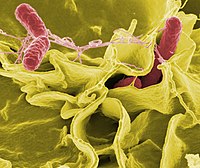
Photo from wikipedia
Salmonella enterica serovars Paratyphi C is highly adapted to humans and can cause a typhoid-like disease with high mortality rates. In this study, three serovar-specific genes were determined for S.… Click to show full abstract
Salmonella enterica serovars Paratyphi C is highly adapted to humans and can cause a typhoid-like disease with high mortality rates. In this study, three serovar-specific genes were determined for S. Paratyphi C, SPC_0871,SPC_0872, and SPC_0908, by comparative genomics method. Based on SPC_0908 and xcd gene for testing Salmonella spp., we have developed a duplex real-time nucleic acid sequence-based amplification (real-time NASBA) with molecular beacon approach for simultaneous detection of viable cells of Salmonella spp. and serotype Paratyphi C. The test selectively and consistently detected 53 Salmonella spp. (representing 31 serotypes) and 18 non-Salmonella strains. Additionally, the method showed high resistance to interference by natural background flora in pork and chicken samples. The sensitivity of the established approach was determined to be 4.89 CFU/25 g in artificially contaminated pork and chicken samples after pre-enrichment. We propose this NASBA-based protocol as a potential detection method for Salmonella spp. and serotype Paratyphi C in food of animal origin.
Journal Title: Canadian journal of microbiology
Year Published: 2022
Link to full text (if available)
Share on Social Media: Sign Up to like & get
recommendations!